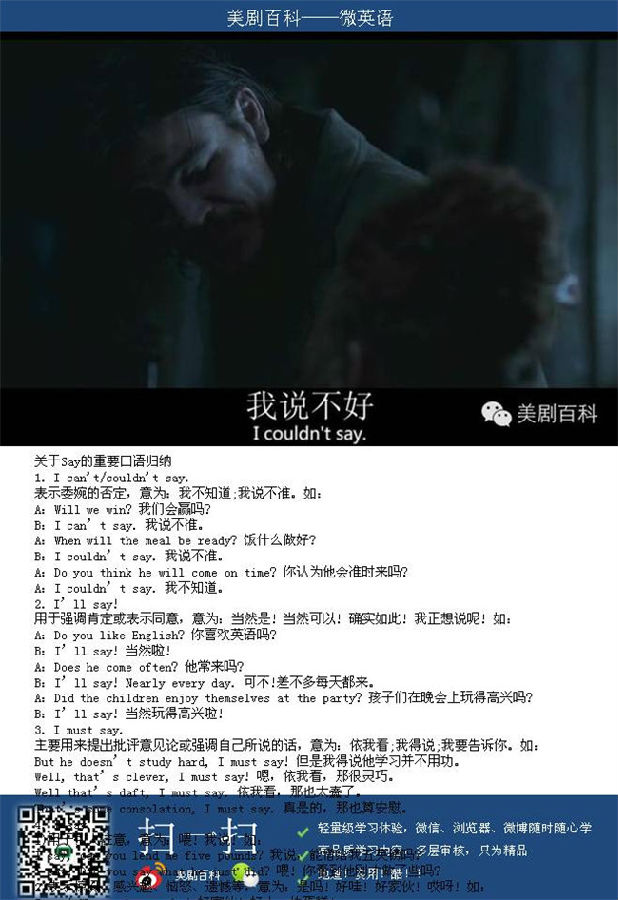關于Say的重要口語歸納
1. I can't/couldn't say.
表示委婉的否定,意為:我不知道;我說不準。如:
A:Will we win? 我們會贏嗎?
B:I can’t say. 我說不準。
A:When will the meal be ready? 飯什么做好?
B:I couldn’t say. 我說不準。
A:Do you think he will come on time? 你認為他會準時來嗎?
A:I couldn’t say. 我不知道。
2. I’ll say!
用于強調肯定或表示同意,意為:當然是! 當然可以! 確實如此! 我正想說呢! 如:
A:Do you like English? 你喜歡英語嗎?
B:I’ll say! 當然啦!
A:Does he come often? 他常來嗎?
B:I’ll say! Nearly every day. 可不!差不多每天都來。
A:Did the children enjoy themselves at the party? 孩子們在晚會上玩得高興嗎?
B:I’ll say! 當然玩得高興啦!
3. I must say.
主要用來提出批評意見論或強調自己所說的話,意為:依我看;我得說;我要告訴你。如:
But he doesn’t study hard, I must say! 但是我得說他學習并不用功。
Well, that’s clever, I must say! 嗯,依我看,那很靈巧。
Well that’s daft, I must say. 依我看,那也太蠢了。
That’s some consolation, I must say. 真是的,那也算安慰。
4. I say.
1)用于引人注意,意為:喂! 我說! 如:
I say, can you lend me five pounds? 我說,能借給我五英鎊嗎?
I say! Did you say what he just did? 喂! 你看到他剛才做了些嗎?
2)表示驚訝、感興趣、惱怒、遺憾等,意為:是嗎! 好哇! 好家伙! 哎呀! 如:
I say! What a huge cake! 好家伙! 好大一塊蛋糕!
I say! He’s late again. 哎呀,他又遲到了。
A:My husband is ill today. He can’t come. 我丈夫今天病了,他不能來了。
B:I say! I’m sorry to hear that. 哎呀,太遺憾了。
5. I wouldn’t say no.
用來表示同意或不反對,意為:我同意;我不反對;好的;好哇! 如:
A:Have another drink? 再來一杯嗎?
B:I wouldn’t say no. 好,再來一杯。
A:Fancy some coffee? 要來點咖啡嗎?
B:I wouldn’t say no. 好哇。
A:Let’s go out for a walk, shall we? 我們出去走走吧,好嗎?
B:I wouldn’t say no. 好吧。
有時其后可接名詞或代詞:
I wouldn’t say no to a cup of coffee. 好吧,就來杯咖啡。














